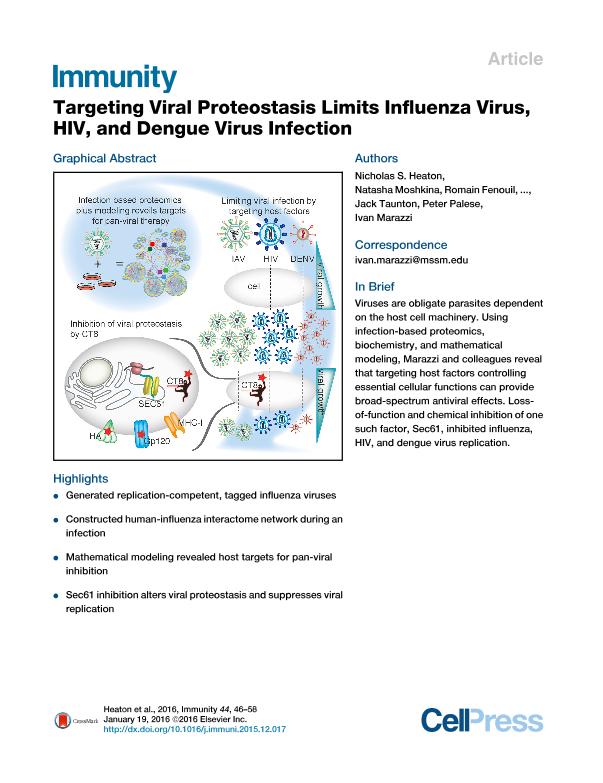Artículo
Targeting Viral Proteostasis Limits Influenza Virus, HIV, and Dengue Virus Infection
Heaton, Nicholas S.; Moshkina, Natasha; Fenouil, Romain; Gardner, Thomas J.; Aguirre, Sebastian; Shah, Priya S.; Zhao, Nan; Manganaro, Lara; Hultquist, Judd F.; Noel, Justine; Sachs, David H.; Hamilton, Jennifer; Leon, Paul E.; Chawdury, Amit; Tripathi, Shashank; Melegari, Camilla; Campisi, Laura; Hai, Rong; Metreveli, Giorgi; Gamarnik, Andrea Vanesa ; García Sastre, Adolfo; Greenbaum, Benjamin; Simon, Viviana; Fernandez Sesma, Ana; Krogan, Nevan J.; Mulder, Lubbertus C.F.; van Bakel, Harm; Tortorella, Domenico; Taunton, Jack; Palese, Peter; Marazzi, Ivan
; García Sastre, Adolfo; Greenbaum, Benjamin; Simon, Viviana; Fernandez Sesma, Ana; Krogan, Nevan J.; Mulder, Lubbertus C.F.; van Bakel, Harm; Tortorella, Domenico; Taunton, Jack; Palese, Peter; Marazzi, Ivan
 ; García Sastre, Adolfo; Greenbaum, Benjamin; Simon, Viviana; Fernandez Sesma, Ana; Krogan, Nevan J.; Mulder, Lubbertus C.F.; van Bakel, Harm; Tortorella, Domenico; Taunton, Jack; Palese, Peter; Marazzi, Ivan
; García Sastre, Adolfo; Greenbaum, Benjamin; Simon, Viviana; Fernandez Sesma, Ana; Krogan, Nevan J.; Mulder, Lubbertus C.F.; van Bakel, Harm; Tortorella, Domenico; Taunton, Jack; Palese, Peter; Marazzi, Ivan
Fecha de publicación:
01/2016
Editorial:
Cell Press
Revista:
Immunity
ISSN:
1074-7613
e-ISSN:
1097-4180
Idioma:
Inglés
Tipo de recurso:
Artículo publicado
Clasificación temática:
Resumen
Viruses are obligate parasites and thus require the machinery of the host cell to replicate. Inhibition of host factors co-opted during active infection is a strategy hosts use to suppress viral replication and a potential pan-antiviral therapy. To define the cellular proteins and processes required for a virus during infection is thus crucial to understanding the mechanisms of virally induced disease. In this report, we generated fully infectious tagged influenza viruses and used infection-based proteomics to identify pivotal arms of cellular signaling required for influenza virus growth and infectivity. Using mathematical modeling and genetic and pharmacologic approaches, we revealed that modulation of Sec61-mediated cotranslational translocation selectively impaired glycoprotein proteostasis of influenza as well as HIV and dengue viruses and led to inhibition of viral growth and infectivity. Thus, by studying virus-human protein-protein interactions in the context of active replication, we have identified targetable host factors for broad-spectrum antiviral therapies. Viruses are obligate parasites dependent on the host cell machinery. Using infection-based proteomics, biochemistry, and mathematical modeling, Marazzi and colleagues reveal that targeting host factors controlling essential cellular functions can provide broad-spectrum antiviral effects. Loss-of-function and chemical inhibition of one such factor, Sec61, inhibited influenza, HIV, and dengue virus replication.
Palabras clave:
Viral Proteastasis
,
Dengue Virus
,
Host-Virus Interactions
,
Antivirals
Archivos asociados
Licencia
Identificadores
Colecciones
Articulos(IIBBA)
Articulos de INST.DE INVEST.BIOQUIMICAS DE BS.AS(I)
Articulos de INST.DE INVEST.BIOQUIMICAS DE BS.AS(I)
Citación
Heaton, Nicholas S.; Moshkina, Natasha; Fenouil, Romain; Gardner, Thomas J.; Aguirre, Sebastian; et al.; Targeting Viral Proteostasis Limits Influenza Virus, HIV, and Dengue Virus Infection; Cell Press; Immunity; 44; 1; 1-2016; 46-58
Compartir
Altmétricas



